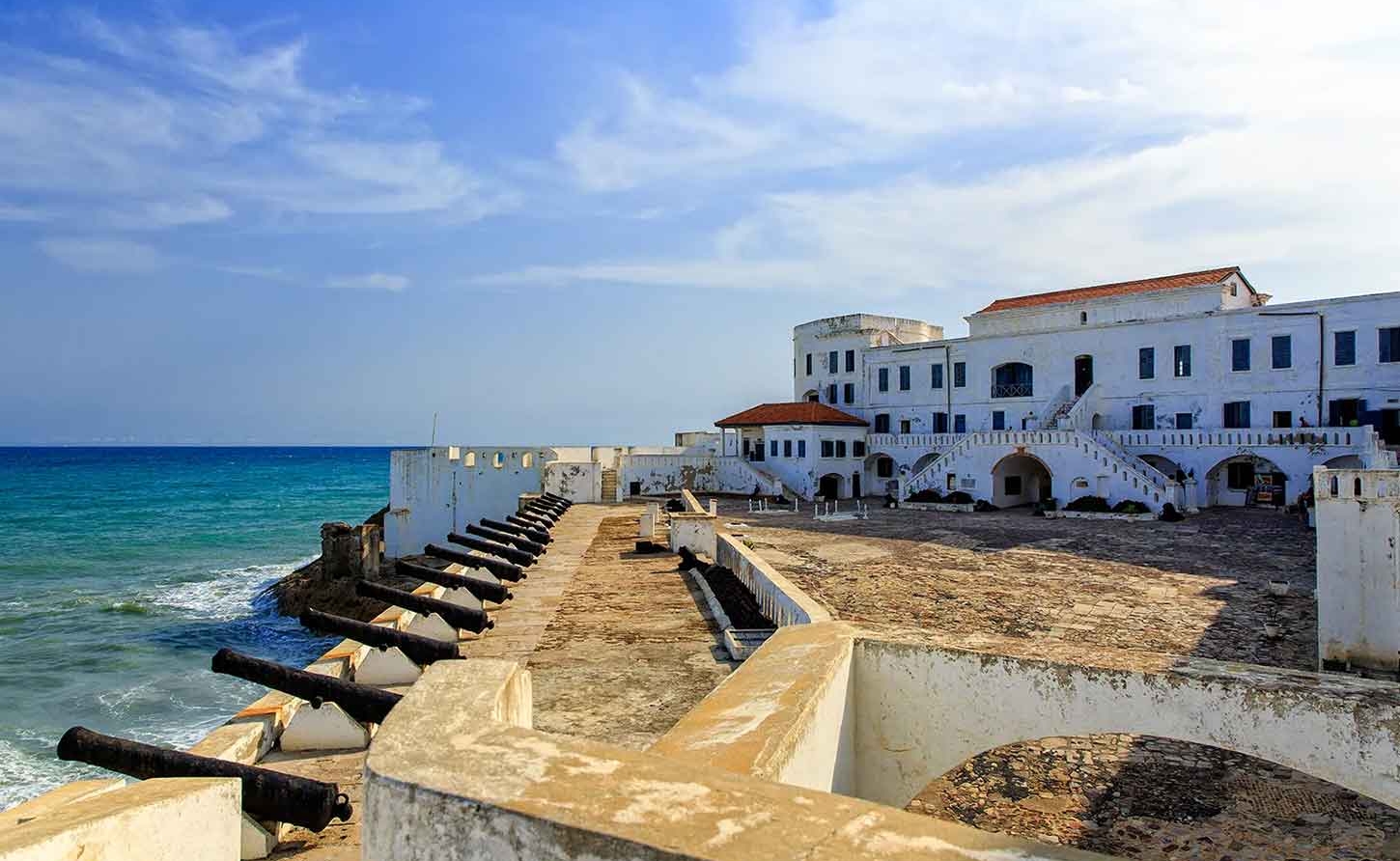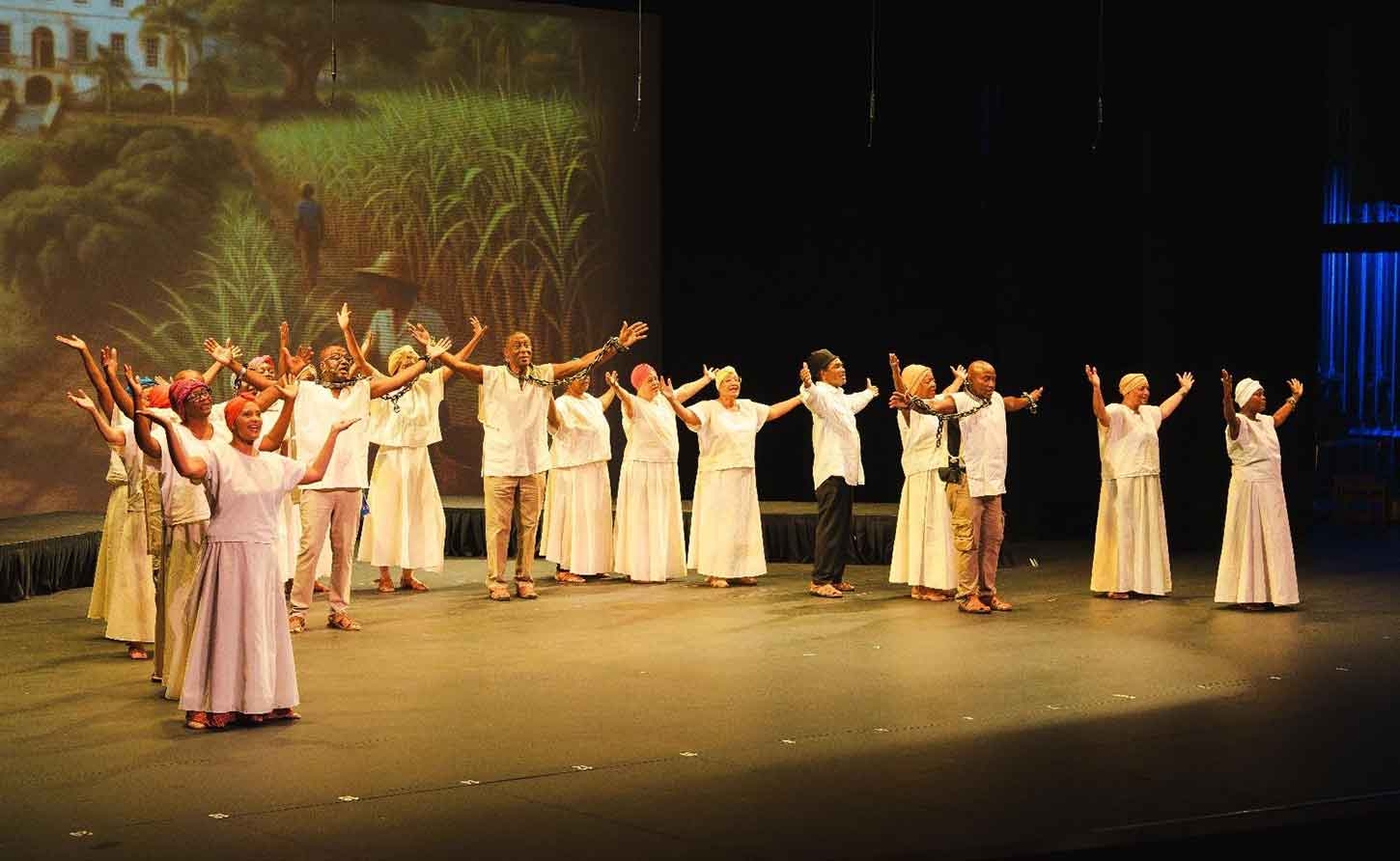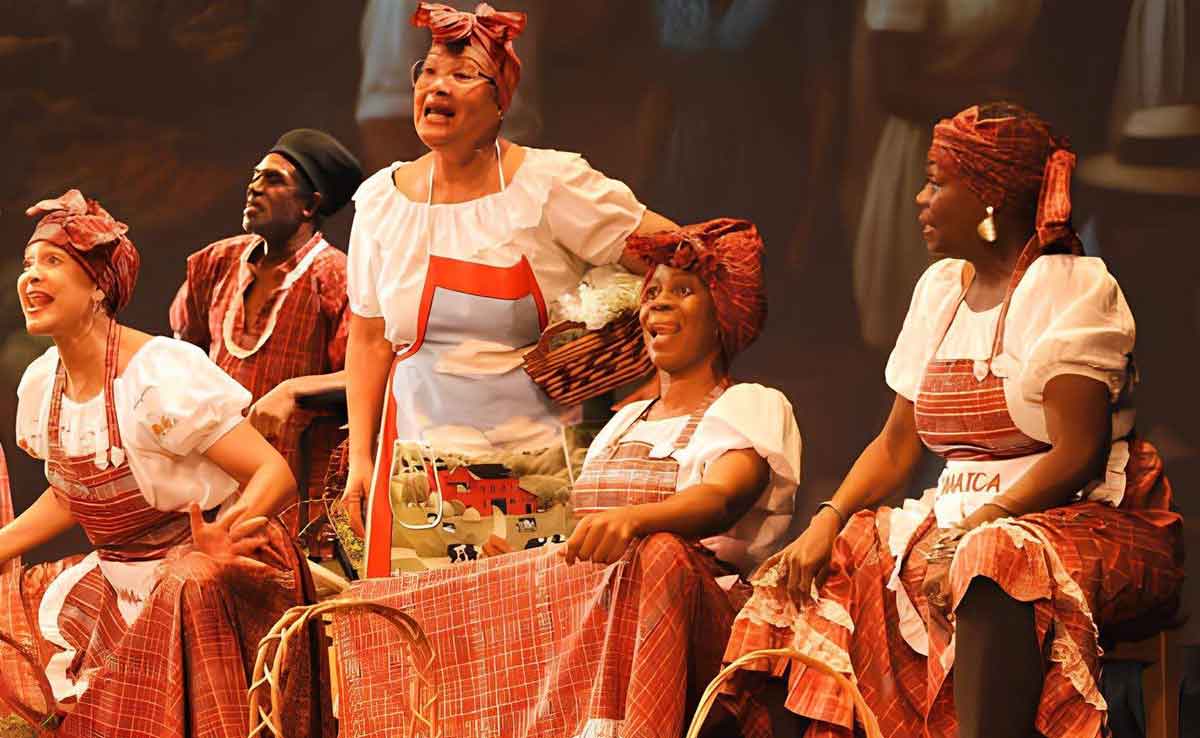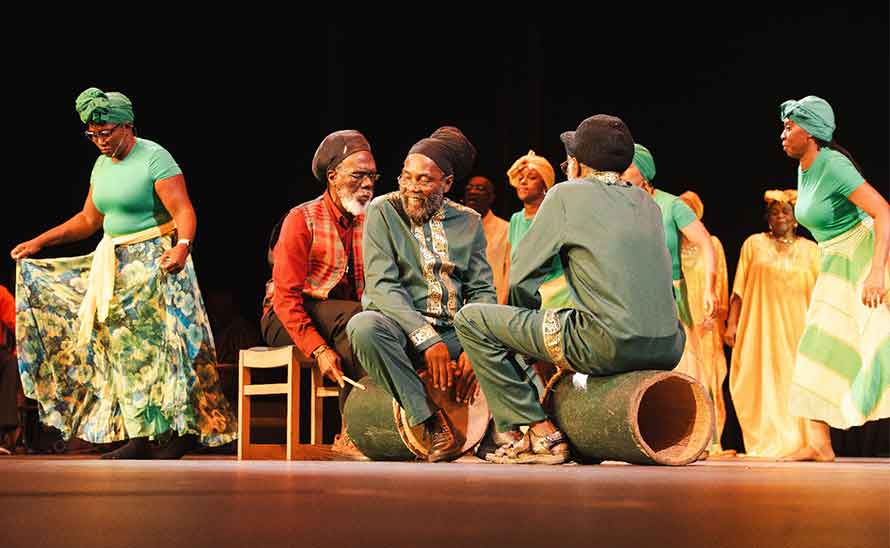AFRICA | Preserving Our Heritage - The Jamaican Folk Revue and Tallawah Mento Band Performs at Cape Coast Castle, Ghana

MIAMI, Florida, July 18, 2025 - On this sweltering Miami Friday, fifty souls are making a journey that will reverse particular currents of history. Not the brutal, involuntary crossing that their ancestors endured centuries ago, but a cultural pilgrimage carrying the preserved essence of “Global Africa” , a return of African heritage back to its motherland.
The Jamaican Folk Revue and Tallawah Mento Band, along with their companions, are not merely traveling to Ghana for performances. They are completing a sacred circle, bringing home the gifts that have been nurtured in Caribbean soil, seasoned by struggle, and refined by resilience.
Their luggage contains more than costumes and instruments; it carries the very soul of a people who have transformed trauma into triumph, oppression into artistry.
This isn't just another cultural exchange. This is sankofa in its purest form—the Akan concept of reaching back to retrieve what has been lost, to move forward with wisdom.
As their plane departs South Florida, it carries with it the living proof that heritage, like seeds scattered by the wind, can take root anywhere and eventually find its way back to the source.
The Stage Set for Reparative Justice

Unlike previous editions that primarily focused on historical commemoration, the 2025 programme seeks to ignite new conversations about reparation justice and the role of the creative arts in confronting the painful legacies of slavery and colonialism.
This is no coincidence. Jamaica's delegation will arrive not as entertainers, but as living testimonies to the power of artistic resistance.
Founded on the belief that the arts, and particularly, theater, can be powerful vehicles for communication and healing, the Pan African Festival of Arts and Culture (PANAFEST) has evolved since its 1992 inception into something more profound than a cultural festival—it has become a platform for continental reconciliation.
The timing is exquisite. Ghana Tourism Authority's CEO Maame Efua Houadjeto described the occasion as "a statement" on cultural restitution, unity and healing through artistic expression, reaffirming Ghana's role as the "Gateway to Africa."
Jamaica's musical odyssey, chronicling the African experience from enslavement to emancipation, will serve as both testimony and offering on this altar of reparative justice.
The Musical Archaeology of Survival
 What Colin Smith and his cultural ambassadors will bring to Ghana is nothing short of musical archaeology—a carefully excavated timeline of African resilience preserved in Caribbean rhythms. Their performance is structured like a spiritual journey through time, each era representing a different facet of the African experience in the New World.
What Colin Smith and his cultural ambassadors will bring to Ghana is nothing short of musical archaeology—a carefully excavated timeline of African resilience preserved in Caribbean rhythms. Their performance is structured like a spiritual journey through time, each era representing a different facet of the African experience in the New World.
The odyssey will begin in the darkest chapters: Enslavement (1500s-1800s), where the raw pain of separation was transformed into coded communications of hope. This won't be mere historical reenactment; it will be ancestral channeling, allowing the audience to feel the weight of chains while simultaneously witnessing the birth of cultural resistance.
The Plantation/Pre-Emancipation Suite (1700s-1800s) will feature the haunting beauty of "Augus Mawnin"—a piece that captures the bittersweet irony of emancipation morning.
Here, the performers revealed how our enslaved ancestors had managed to preserve their spiritual practices even under the most oppressive conditions, weaving African cosmology into Christian hymns, creating a syncretic spirituality that would become the backbone of Caribbean cultural identity.
As the performance progressed into the Post-Emancipation/Market Suite (1830s-1930s), featuring beloved classics like "Linstead Market," the audience will witness the transformation of survival into celebration.
These were the songs of a people learning to be free, carrying their produce and their culture to the market squares that became stages for cultural preservation. The vendors' calls became musical mantras, economic necessity transformed into artistic expression.
The Pocomania Revival Songs (1920-1970) section will demonstrate how African spiritual practices not only survived but thrived in the Caribbean context.
These were the songs of a people who had learned to dance with their ancestors even on foreign soil, proving that the spiritual connection to Africa could never truly be severed.
Icons of Resistance and Identity
The Pan African Suite (1970-1990) represented the crescendo of cultural confidence. Here, the delegation honored the revolutionary spirits who had carried the message of African pride to global audiences. Marcus Garvey's vision of African unity found its musical expression through the reggae revolution of Bob Marley, Peter Tosh, and Jimmy Cliff.
These weren't just entertainers; they were prophets of a new pan-African consciousness, A Global Africa, their music becoming the soundtrack of liberation movements across the diaspora.
This section was particularly poignant within the PANAFEST context. The festival's emphasis on reparative justice found its perfect embodiment in these musical revolutionaries who had dared to demand not just equality, but a complete reimagining of the relationship between Africa and its scattered children.
Their songs were both indictment and invitation—calling out historical injustices while extending a hand of reconciliation.
The Sacred Return to Cape Coast

This is no ordinary concert venue. Cape Coast Castle, a UNESCO World Heritage site, stands as one of the most significant slave trading posts in West Africa. Its dungeons once held thousands of captured Africans before they were forced through the "Door of No Return" onto slave ships bound for the Americas.
The castle's very stones are saturated with the urine, the tears, prayers, and final words of our ancestors fresh from the " Last Bath" and who never lived to see their homeland again.
To perform here will be to complete an act of historical restoration. The castle that had once witnessed the violent separation of African families will now host the spiritual return of their descendants. The irony is profound and purposeful—where once there had been the sound of chains and weeping, there will now be the sound of celebration and healing.
Colin Smith, the venerable director of the Jamaica Revue and Tallawah Mento Band, understands the gravity of this moment. "Emancipation songs have a special connection," he reflects, "and shows how music was used to cope with slavery while inspiring hope for a better life."
At Cape Coast Castle, these songs will fulfill their ultimate purpose—not just coping with historical trauma, but transforming it into triumphant return.
The Reverential Night ceremony traditionally begins with a candlelit procession from Mfantsipim Senior High School junction, where a bonfire is lit and candles distributed to create a river of light moving toward the castle.
Participants, led by traditional Asafo militia, walk in solemn procession, carrying the weight of ancestral memory while simultaneously lighting the way forward.
At the castle, wreaths are laid in honor of those who perished during the Middle Passage, followed by a moving ceremony that reenacts the slave passage through the "Door of No Return."
But this time, the narrative will be reversed. Instead of departure, there will be arrival. Instead of separation, there will be reunion. The door that once marked the end of African identity will now mark its return.
The Eternal Cycle of Preservation
What Jamaica's cultural delegation will bring to Ghana is more than entertainment—it is evidence of the impossible made possible. They carry with them the living proof that culture, like DNA, contains within it the instructions for its own preservation and renewal.
The acclaimed dub poet Malachi Smith, who has penned special poems for this historic occasion, understands that his words will be spoken not just to a Ghanaian audience, but to the spirits of ancestors who have been waiting centuries for this moment of vindication.
His poetry will bridge the gap between past and present, between the trauma of departure and the joy of return.
"A history of Africans on Jamaican soil," Colin Smith explains about their performance, "the gifts of character and cultural resolve that they brought…and how well those gifts have been nurtured and preserved.
This is what we're taking back to Ghana." This isn't cultural tourism; it is cultural repatriation—the return of treasures that were scattered by violence but preserved by love.
The performances at the National Theatre in Accra on July 23rd and at the PANAFEST Village in Cape Coast on July 28th will serve as preludes to the main event. But it will be the midnight performance at Cape Coast Castle that completes the circle, transforming a site of historical trauma into a stage for cultural triumph.
Songs That Will Heal Centuries
In the end, what Jamaica's fifty cultural ambassadors are set to achieve is something that transcends performance art. They will demonstrate that heritage, properly preserved and passionately maintained, possesses the power to heal even the deepest historical wounds.
Their journey from Kingston to Cape Coast is not just a geographical movement but a spiritual restoration—proof that the bonds severed by slavery can be rewoven through the threads of culture.
The songs they will carry—from the work songs of plantation mornings to the revolutionary anthems of reggae prophets—are more than entertainment. They are messages in bottles, thrown into the Atlantic centuries ago and finally washing up on Ghana's shores.
Each rhythm is a heartbeat that has never stopped beating, each melody a memory that has never faded.
When the final notes of their performance echo off the walls of Cape Coast Castle, mixing with the sound of Atlantic waves, something profound will be accomplished. The circle will be complete. The heritage will be preserved.
The ancestors will be honored. And for one sacred midnight moment, the Door of No Return will become the Door of Eternal Return—a passage not to exile, but to homecoming.
That's a heritage preserved.
-30-

 En
En  Ar
Ar